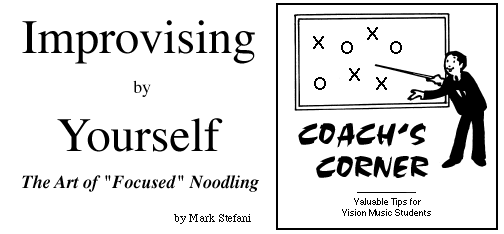
This edition of "Coach's Corner" is dedicated to those of you who are continually aspiring to reach greater heights as improvisers. A great deal of what I spend my lesson preparation time deals directly or indirectly with this subject, so hopefully these tips and guidelines will help you to overcome those inevitable hurdles that lie in the way of our success. Before I get any further, let's first take a brief look at the musical styles associated with improvisation, and the benefit of being competent at this skill.
I'm sure, by this time, that it comes as absolutely no shock to you that I have an infatuation with blues and jazz music. Why? Simple. I love to improvise, and those two styles are predicated on a player's ability to do so, whether as a soloist or within the context of the rhythm section. There are, of course, other styles that rely on this ability, but not to the same extent. One point that I often make to players and songwriters of a different stylistic persuasion is the inherent musical value (in the long run) that the study of improvisation provides. Let me elaborate on that...
When I write a contemporary (i.e. non-blues or jazz) song, I draw liberally on my "language" skills acquired through the pursuit of improvisation. These elements usually surface as melodies and bass lines, and I like to believe that having strengths in those areas contributes mightily to the overall success of the final work. So, in a sense, I may not be improvising "on-the-fly," but rather within the context of composer/arranger. I often make this point to songwriters that I coach, suggesting that their quest to observe and study the language of improvisation will pay huge dividends in the way of stronger original material. Songwriters often fall into the trap of looking only at lyrical content, without weighing the fact that a successful popular song is a smooth combination of lyrics, melody, and harmony.
Now let's talk about more effective ways to go about improving your soloing skill. Contrary to what many might think, a great deal can be accomplished in this area without involving yourself in a "live" situation. But you must be intelligent with the way that you absorb the language as well as apply it. It's the latter of the two that most improvisers run into problems with.
If you're like most, you probably have some trouble implementing new riffs/cliches while in either a live or taped/midi accompaniment environment. I don't know what it is about hearing any backup in real time, but the "automatic pilot" seems to take over, prohibiting thinking about using something new. Solution? Sure.
I call it "dry improvisation," or as the subtitle states, "The Art of Focused Noodling." Try improvising freely, initially on a simple blues progression, alternating between rhythm and solo. Stop the band (yourself) at any point in time and consider that new riff that you'd like to use. Consider the progression. Consider the left-hand position and fingering. Consider the right-hand technique. Consider the phrasing and feel of the line. Do this as much as you feel necessary to "lock-in" on what you're trying to suggest to your automatic pilot, then start the band (yourself) up again and move on.
Improvising by yourself, if done the right way, can provide some huge soloing breakthroughs. Give it a try!
"Coach's Corner" is an ongoing addition to Vision Music. The purpose of these brief articles is to share philosophy, offer practical insights, and to enhance your musical studies.
For the "ultimate" guitar and bass experience...